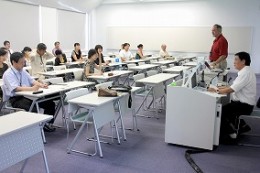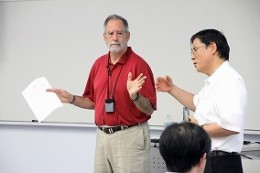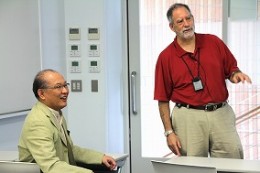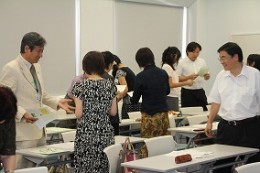Lectures, Symposiums & Others
Empowerment : An Illuminating Pedagogy
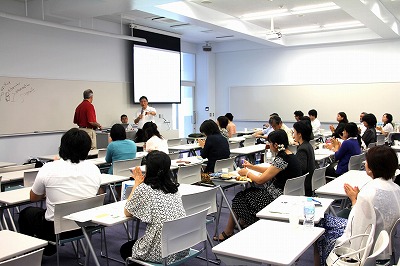 Reitaku University hosted a very stimulating and illuminating workshop on character education, entitled ‘A Pedagogy of Empowerment’, on 20 August, 2013. Led by Professor Marvin W. Berkowitz of the University of Missouri and sponsored by Reitaku University’s Center for Moral Science and Education (CMSE), it was attended by dozens of educators and counsellors who gathered to hear Professor Berkowitz outline his thoughts on the theory and practice of character education.
He opened the workshop with an activity in which participants asked questions based on the 5 W’s. The aim of this was to build relationships among the attendees, for as Professor Berkowitz said, ‘Relationships, Relationships and Relationships are the 3Rs of character education.’ Additionally, Relationships proved to be one of the five key elements of his theory: the other four were Prioritization (of character education over teaching knowledge), Intrinsic Motivation (for moral conduct rather than reward-driven motivation), Modelling (by teachers) and Empowerment (of students).
Reitaku University hosted a very stimulating and illuminating workshop on character education, entitled ‘A Pedagogy of Empowerment’, on 20 August, 2013. Led by Professor Marvin W. Berkowitz of the University of Missouri and sponsored by Reitaku University’s Center for Moral Science and Education (CMSE), it was attended by dozens of educators and counsellors who gathered to hear Professor Berkowitz outline his thoughts on the theory and practice of character education.
He opened the workshop with an activity in which participants asked questions based on the 5 W’s. The aim of this was to build relationships among the attendees, for as Professor Berkowitz said, ‘Relationships, Relationships and Relationships are the 3Rs of character education.’ Additionally, Relationships proved to be one of the five key elements of his theory: the other four were Prioritization (of character education over teaching knowledge), Intrinsic Motivation (for moral conduct rather than reward-driven motivation), Modelling (by teachers) and Empowerment (of students).
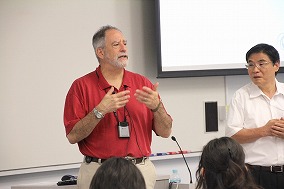 Professor Berkowitz argued that the goal of character education should be to help students autonomously develop a character suitable to living in, and promoting the common good of, a democratic society. Hence the ‘empowerment’ of students involves training them in democracy; it requires them in a given situation to think for themselves about the right thing to do, to discuss it with their friends, and to solve the problems they face. In order to facilitate this, teachers have to provide models and allow their students to follow their example. In doing this, according to Berkowitz, teachers must not reward students in conventional ways, like giving them candy or public praise, since this would give students the idea that morality is a tool to realize self-interest; rather, teachers should show students what is right and wrong, and encourage them do the right thing for the sake of its intrinsic rightness. Such education can be implemented only in networks involving all stakeholders, (not only teachers and students, but all staff members in a school): hence the need for the 3Rs in character education. To illustrate the priority of moral education over that for intelligence, Professor Berkowitz quoted Theodore Roosevelt, who said: ‘To educate a man in mind and not in morals is to educate a menace to society’, a claim which resonates with the philosophy of Chikuro Hiroike, who laid the foundations of Reitaku University; it should be noted that Roosevelt also said: ‘A man who has never gone to school may steal a freight car; but if he has a university education, he may steal the whole railroad’.
Professor Berkowitz argued that the goal of character education should be to help students autonomously develop a character suitable to living in, and promoting the common good of, a democratic society. Hence the ‘empowerment’ of students involves training them in democracy; it requires them in a given situation to think for themselves about the right thing to do, to discuss it with their friends, and to solve the problems they face. In order to facilitate this, teachers have to provide models and allow their students to follow their example. In doing this, according to Berkowitz, teachers must not reward students in conventional ways, like giving them candy or public praise, since this would give students the idea that morality is a tool to realize self-interest; rather, teachers should show students what is right and wrong, and encourage them do the right thing for the sake of its intrinsic rightness. Such education can be implemented only in networks involving all stakeholders, (not only teachers and students, but all staff members in a school): hence the need for the 3Rs in character education. To illustrate the priority of moral education over that for intelligence, Professor Berkowitz quoted Theodore Roosevelt, who said: ‘To educate a man in mind and not in morals is to educate a menace to society’, a claim which resonates with the philosophy of Chikuro Hiroike, who laid the foundations of Reitaku University; it should be noted that Roosevelt also said: ‘A man who has never gone to school may steal a freight car; but if he has a university education, he may steal the whole railroad’.
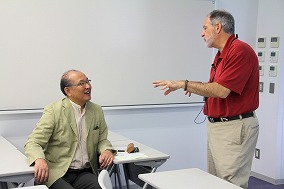 As well as focusing on theory, Berkowitz gave examples of practical success stories reported by students of his who work as administrators or teachers in grade schools. One of them concerned a mischievous boy who once flooded a bathroom in his elementary school. When the principal, one of Berkowitz’s students, found out who was responsible, she entered the boy’s classroom and said to him, calmly, ‘Follow me’. When the principal opened the door to the bathroom, the boy saw a janitor, whom all the students, including himself, loved, taking care of the problem he had caused. ‘I’ll take care of the rest of this’, said the boy to the janitor. From that time forward, the bathroom was never flooded again (or, if it did, this boy was not to blame). In another school, the principal one day went to the cafeteria to organise a celebration for a student who had acted responsibly. But when told there would be an ice cream party, the student said, ‘I acted as I did just because it was right to do so… not for an ice cream party.’ So the ice cream party did not take place.
In a democratic society like the United States, it is indispensable that the population acts to promote the common good, not in ways that are in fact disguisedly self-serving in nature, but purely for its own sake. This prerequisite for a properly working democracy is attainable only if moral education is given priority, as Roosevelt suggested. Professor Berkowitz’s view of character education aims to achieve this. Amid the storm of bad news about America apparent on both macro and micro levels, his views allow us to rediscover the hope that the United States, a huge friend of Japan, can rise again, empowered by admirable characters who will become future philosopher lawmakers.
As well as focusing on theory, Berkowitz gave examples of practical success stories reported by students of his who work as administrators or teachers in grade schools. One of them concerned a mischievous boy who once flooded a bathroom in his elementary school. When the principal, one of Berkowitz’s students, found out who was responsible, she entered the boy’s classroom and said to him, calmly, ‘Follow me’. When the principal opened the door to the bathroom, the boy saw a janitor, whom all the students, including himself, loved, taking care of the problem he had caused. ‘I’ll take care of the rest of this’, said the boy to the janitor. From that time forward, the bathroom was never flooded again (or, if it did, this boy was not to blame). In another school, the principal one day went to the cafeteria to organise a celebration for a student who had acted responsibly. But when told there would be an ice cream party, the student said, ‘I acted as I did just because it was right to do so… not for an ice cream party.’ So the ice cream party did not take place.
In a democratic society like the United States, it is indispensable that the population acts to promote the common good, not in ways that are in fact disguisedly self-serving in nature, but purely for its own sake. This prerequisite for a properly working democracy is attainable only if moral education is given priority, as Roosevelt suggested. Professor Berkowitz’s view of character education aims to achieve this. Amid the storm of bad news about America apparent on both macro and micro levels, his views allow us to rediscover the hope that the United States, a huge friend of Japan, can rise again, empowered by admirable characters who will become future philosopher lawmakers.
Norikazu Furukawa (Researcher of CMSE)
